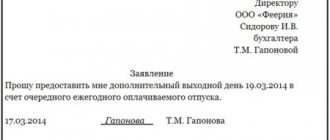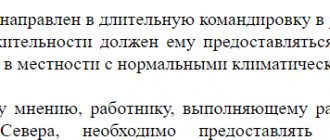First, let’s remember what the general procedure for “seeing off” an employee on vacation consists of.
- Drawing up a vacation schedule for the next calendar year (Article 123 of the Labor Code of the Russian Federation).
- Familiarization of employees with the vacation schedule against signature (Part 2 of Article 22 of the Labor Code of the Russian Federation).
- Notifying the employee against signature of the start of vacation no later than two weeks before its start (Part 3 of Article 123 of the Labor Code of the Russian Federation).
- Issuing an order to grant leave to an employee during the period established by the leave schedule (Part 2 of Article 123 of the Labor Code of the Russian Federation).
From the start date of the vacation established in the order, the necessary codes should be entered in the working time sheet:
- “FROM” or “09” – if the employee is on annual basic paid leave;
- “OD” or “10” – if the employee is on annual additional paid leave.
Please note that the Labor Code does not give an employee the right not to take his/her allotted leave. Taking annual paid leave is not only the right, but also the duty of the employee.
Your rights if you want to go on vacation
This material was updated on 03/05/2021.
Vacation is a time when you don’t have to work, and your employer pays you money for each day. Moreover, you receive them in advance and do not have to return them.
Ekaterina Miroshkina
knows about holiday rights
Spread the knowledge!
Send this article to those who might find it useful
Employers often take advantage of the fact that you do not know about your rights to vacation and its payment: they give you fewer days, underpay, pay too late and ask you to come to work in the middle of your vacation.
Download these cards and share with your loved ones so that everyone can understand their right to vacation and money.
What to do if your boss won’t let you go on vacation?
Misunderstandings often arise between personnel and employers regarding the provision of leave.
If an employee wants to exercise his legal right to rest, but the employer does not want to let him go, then there are several ways to resolve the conflict:
- agreeing on another rest period peacefully;
- eliminating the precedent due to which the manager does not let the employee go;
- submitting a written application to the employer for leave;
- petition to the competent authorities, including the labor inspectorate and the court.
The first step should always be to try to resolve the problem peacefully. It is much easier to agree on the transfer of leave or other nuances of its provision in a mutual manner.
However, if no measures bring results, then the employee has the right to apply to the appropriate authorities to protect his interests. If the audit reveals that the employer has neglected the rights of the employee, he will be fined. As a result, you can go on vacation after starting a new job after 6 months for a period of 14 days.
If it is necessary to take a break before this period, then the provision of leave is possible after agreement with the employer. Registration of vacation begins with drawing up an application. It must be agreed upon by the manager. If the employer does not release the employee, the latter can apply to protect his rights in court or the labor inspectorate.
The right to go on vacation after six months of work or even earlier
Base. Labor Code of the Russian Federation Art. 122, art. 124
How it works. If there is an employment contract, then paid leave is provided for each year of work. You can go on your first vacation six months after employment. And if the employer doesn’t mind, you can rest earlier: if everyone agrees, this is not a violation.
Some categories of employees may require leave earlier than six months, and they cannot be refused:
- Women - before and after maternity leave. And their husbands. Maternity leave is maternity leave, not parental leave for a child under one and a half years old.
- Workers under 18 years of age.
- Adoptive parents of children under three months.
- Part-time workers if they are on vacation from their main job.
If you belong to any of these categories and want to go on vacation, you can write an application and go. Even if the employer is against it, this is not considered absenteeism.
Vacation after six months of work can be taken even for the whole year - in advance. For example, you have worked for six months, but want to rest for 28 days - that is, you are going to take all the vacation that you are entitled to for the year. This needs to be agreed with the employer, because he is obliged to pay for vacation that you have not yet earned. If you decide to quit, you need to somehow withhold the overpayment, and this is not always possible even through the courts. Then the extra vacation pay becomes a loss to the employer.
See also: 8 facts about vacation that you might not know
When does an employee have the right to first leave under the Labor Code of the Russian Federation?
Every worker has the right to rest days, while the employee retains his position and average earnings.
This point is clearly explained by Article 21 of the Labor Code of the Russian Federation. Is any employer obliged to provide an employee with annual rest after 6 months after hiring the person?
Yes, the right to vacation, which arises for an employee after six months of work at a new place, does not depend on the legal form of the employer’s activities (individual entrepreneur, LLC, JSC), on the work schedule and the amount of earnings. Leave is due to all workers without exception, including those who work part-time.
The employer does not have the right to transfer an employee to another workplace or dismissal during vacation, as well as to deprive him of vacation benefits. This point is clearly explained in Article 114 of the Labor Code of the Russian Federation.
Note! There is some nuance. The right to leave is available only to those persons who are officially registered with the company, that is, with the conclusion of an employment contract, a mark in the work book and other norms provided for by Russian legislation, and nothing else.
Agency and civil law contracts do not establish employment relationships and therefore do not guarantee the provision of leave. These types of contracts should not be confused with an employment contract. In exceptional cases, agency and civil law contracts may be recognized as employment contracts. Accordingly, in this case they will have all the guarantees that are provided for employees of the Labor Code of the Russian Federation.
When does an employee have the right to apply for leave, or more precisely, after how many months can he take it at a new job? The first right to rest days arises for the employee after six months of work. That is, after this time, a newcomer can calmly ask for leave. This is clearly explained by Article 122 of the Labor Code of the Russian Federation.
Is it possible to go on vacation before 6 months? Are there any categories of citizens who have the right to take a vacation without working for 6 months? Yes. The right to early leave before the employee has worked for six months is extended to the following citizens:
- Spouses of persons who serve.
- A citizen whose wife went on maternity leave.
- Heroes of the Russian Federation.
- Honorary donors of the Russian Federation.
- Persons who have donated blood 40 times or more.
- Minor workers (granting leave to employees under 18 years of age is discussed here).
- Citizens who received radiation exposure while performing work in Semipalatinsk and liquidators of the Chernobyl accident.
- Adoptive parents of babies up to three months of age.
- Veterans.
- Knights of the Order of Glory.
- Women in position before maternity leave.
- Mothers caring for children under three years of age.
All of the above categories of citizens can be granted early leave, that is, leave before the employee has worked for 6 months. Employers do not always make concessions and comply with the laws of the Russian Federation, or do so without much desire.
Recommendation. All issues related to vacation must be discussed in advance with the employer to avoid conflict situations.
The employee is included in the vacation schedule upon his employment. In this case, the schedule is formed no later than 14 days before the new year.
The schedule is approved by the director of the company after the schedule is fully drawn up by an HR department specialist or HR employee.
This point is explained by Article 123 of the Labor Code of the Russian Federation. The form that is used for this is called Form T-7.
As was written above, every person who is hired in accordance with the current labor legislation of the Russian Federation (officially) has the right to go on their first vacation after working for only six months.
In this case, the worker has the right to take not only 14 days, as everyone usually assumes, but completely all the days provided for by law. This means that the employee must be given 28 days of rest, and no one has the right to interfere with this (you will find more information about the duration of leave in a separate article).
It is a very common misconception that after six months an employee can only ask for two weeks of rest. This is a fallacy and has nothing to do with the law.
However, a request for 28 days of vacation may be immediately refused. At the same time, no one will punish the employer. Indeed, in some areas of activity, a long absence of specific employees can have a detrimental effect on the work of the organization as a whole. In this situation, you should not go into conflict with your employer; it is better to negotiate peacefully and come to a common denominator.
Reference. There are enterprises that may use a special type of leave. In this case, all the nuances must be specified in the employment contract.
Payments to an employee going on vacation must be made three days before the start of the vacation. This is explained by Article 139 of the Labor Code of the Russian Federation.
When calculating vacation pay, a standard scheme is used. The calculation will take into account:
- Number of rest days.
- Average total income.
- Billing period.
Let's give an illustrative example: A. A. Ivanova, a cleaning lady at Romashka LLC, has a salary of 15,000 rubles. Bonuses are not provided for according to the employment agreement. Accordingly, earnings for all six months were 15,000 rubles.
15,000/29.4 29.4 IS THE GENERAL RATIO that is established by the state, and it means the average number of days.
510.2*14=7142.8 rubles.
This is exactly the amount the cleaner will receive when she goes on vacation.
In general, this right appears after six months of work in a new place. Article 122 of the Labor Code establishes just such a period.
However, you won’t be able to automatically go on vacation after six months. The employer may well refuse leave at this very moment if, for example, production needs do not allow him to let you go on vacation.
If your employer does not allow you to take leave after six months of employment, they must do so at least until eleven months have passed since you started your new job. Another month will be the vacation itself, and during the first year of work you will thus use your vacation.
Having answered the question whether it is possible to provide vacation earlier than 6 months, it is worth paying attention to how many days such vacation should be. The length of the period depends on what position the person applying holds and what social category he belongs to. Individuals may take an extended rest period of 30 days or more. Here we are talking about the following employees:
- under the age of majority;
- having health limitations;
- those employed in work with chemical weapons;
- teachers and researchers.
The opportunity to go on vacation before the six-month period of work is prescribed in Article 122 of the Labor Code of the Russian Federation. Here, the consent of the head of the company is necessary, since some citizens, after receiving leave and payment, apply for resignation. As a rule, consent is given only in relation to employees who are considered reliable and conscientious workers, and also have certain recommendations.
If an employee decides to resign immediately after a vacation, management will be able to withhold paid vacation pay from the compensation due in connection with the dismissal. If there is nothing to keep the money from, you will have to file an application with the court. It is for this reason that employers try not to provide such an opportunity to employees.
However, there are certain circumstances defined by law in which the manager will not be able to refuse the required days. The following cases are possible:
- minor citizens;
- pregnant women;
- employees who have taken in (adopted) children under 3 months;
- parents of children with disabilities under 18 years of age;
- spouses with two children under 14 years of age;
- men whose spouses went on maternity leave;
- women whose spouses are in military service;
- veterans of combat battles of 1941-45;
- persons who were involved in the Chernobyl accident;
- part-time employees.
Current legislation guarantees all workers an annual long leave. In addition to the fact that it is paid for by the employer, when using it, employees retain their jobs, salaries and other working conditions. The procedure for granting, registering, and paying for vacations is regulated by the Labor Code of the Russian Federation.
For new employees, there are some differences and restrictions in the provision of basic leave. Moreover, they apply to both ordinary employees and certain categories of personnel.
The responsibility for complying with the procedure for granting vacations rests with employers. Therefore, it is important to know it and strictly adhere to it. Violations are subject to administrative liability and other types of penalties.
The rights of citizens to rest at a new job are protected by labor legislation. Article 122 establishes that the first paid vacation period is due to an employee after 6 months of continuous cooperation with the employer. He can apply for leave in the 7th working month. In accordance with Art. 115 the total duration of rest is 28 days.
With the approval of the employer, the first leave can be granted before six months of work.
Certain categories of workers are entitled to it, regardless of the duration of work at a particular enterprise:
- citizens under the age of 18;
- employees who are expecting the birth of a child;
- employees who adopted children under 3 months of age;
- other personnel who have privileges granted by federal laws (veterans, spouses of military personnel, part-time workers, etc.).
Attention! Designated categories of employees are given leave based on personal applications indicating and officially confirming their rights to early leave. The employer does not have the right to refuse, even in the event of an urgent production need for them.
The right to rest at least 28 days a year
Base. Constitution of the Russian Federation Art. 37, Labor Code of the Russian Federation Art. 107, art. 115
How it works. When you got a job, you received not only responsibilities, but also rights - for example, to rest. For each year you work, your employer is required to provide you with 28 days of paid vacation. On these days you will not go to work, but the employer will pay for each calendar day of rest. The amount may differ from the salary in any direction: vacation has its own calculation rules. Each day of your vacation will cost the employer an amount equal to the average daily earnings for the last 12 months.
28 calendar days of vacation are not due for each calendar year, but for each worked year. It happens that accountants and personnel officers get confused and count the period from January 1st. This is a mistake that may cause you to miss out on your legal rest days. The year of work that gives you the right to full vacation does not begin on January 1, but on the day you entered into an employment contract.
For example, Ivan got a job on August 1, 2021. This means that from August 1, 2021, he already has the right to 28 days of rest. If Ivan has already taken part of his vacation, he can take more by the end of 2021. The employer cannot say: “Ivan, you have already used your vacation for 2018, but have not yet earned it for 2021.”
But the year of work must be continuous. For example, this period will not include absenteeism and the time when the employee was on parental leave. But vacation at your own expense up to 14 days a year will be included.
See also:
- Where is the best place to relax in Russia?
- 5 ways to lose money while on vacation
How many months after settling in a new place is annual rest required?
After working for a new employer for 6 months, a specialist receives full rights to all types of rest provided for in the employment contract:
- main annual;
- additional;
- extended, etc.
Russian legislation allows vacations to be given in advance in the first working year. If an employee is dismissed before the time worked, for which rest has already been provided, the paid vacation pay is allowed to be withheld (Article 137 of the Labor Code of the Russian Federation). The calculation is made according to the rule of Article 138 of the Labor Code, which sets the maximum withholding of earnings at 20%.
It is important to know! An exceptional case for calculating the duration of the first vacation period is additional leave, which is provided when working in harmful or dangerous conditions. It must be drawn up in proportion to the time actually worked (Article 121 of the Labor Code of the Russian Federation).
To determine the order of vacation periods, employers maintain special schedules. The procedure for drawing up the next vacation schedule for the coming year is established by Art. 123 Labor Code of the Russian Federation. The document is drawn up, agreed upon and approved two weeks before the end of the current calendar year.
What to do with new employees if the vacation schedule has already been drawn up? There are no restrictions for either the employee or the employer in this situation. The vacation schedule is not adjusted retroactively. Upon written application of a new employee, he is granted the first leave at the time prescribed by law, unless other agreements are determined by the parties to the employment relationship.
Attention! The Labor Code does not prohibit adjustments to the main vacation schedule during the year. For this, the HR department prepares an additional schedule, agreed upon with employees, the organization’s trade union and approved by the manager in the usual manner.
Registration of the vacation period in the first year of employment is no different from other years.
The order is as follows:
- An employee writing a statement.
- Approval of the application by the manager and issuance of an order (Form T-6).
- Calculation of vacation pay with entering information into the vacationer’s personal card and time sheet.
Vacation pay is calculated based on average earnings for the previous year. In the case of a new employee who has not worked for 12 months, the calculation takes into account the salary for the time actually worked from the beginning of his work until the month in which the application was submitted. In the same way, average earnings are calculated and the billing period is determined.
Sample application for regular paid leave
At a new place of work, vacation is due from the first year (Part 1 of Article 122 of the Labor Code of the Russian Federation). Every subordinate, regardless of the duration of cooperation with the employer, has the right to receive vacation days annually. Consequently, employees have every legal basis to demand leave in a new organization in the first year of their work.
All employees working under employment contracts have the right to leave. The rest conditions of employees working under civil contracts are determined by the parties independently. Such agreements include contract agreements, provision of paid services and some others.
Vacation is a continuous period of rest for an employee lasting several days with the vacationer retaining a job at the enterprise, salary and other working conditions.
As a general rule, the first vacation after getting a job is due after 6 months of work with a new employer (Part 2 of Article 122 of the Labor Code of the Russian Federation). The legislation does not specify the specific moment of its provision. Therefore, you can claim the right to leave immediately after six months of work or later, at a convenient time before the end of the calendar year.
If annual paid leave was not used, the employer must compensate it financially. Despite the fact that the procedure for providing rest to employees is regulated by law, it would not be amiss to reflect it in the employment agreement. All employers are required to give employees vacation after six months of work. They cannot refuse this.
The Labor Code determines that the employer has the right to give leave earlier than the established period (Part 2 of Article 122). He makes this decision on his own. There are no legal grounds for an ordinary employee who has not worked for six months to quit. The exception is the categories of personnel named in Part 3 of Art. 122.
No video.
| Video (click to play). |
A new employee has the right to early leave, for example, if he:
- has not reached the age of majority;
- adopted an infant child (not older than 3 months);
- is a pregnant woman (before or immediately after a vacation related to this event).
There are other exceptional cases defined by federal legislation.
The frequency of vacation periods at the enterprise is established by the vacation schedule. The document is drawn up annually 2 weeks before the new year (Article 123 of the Labor Code of the Russian Federation). For employees who have not worked for six months, vacations are planned for the next year or changes are made to the current schedule.
As a general rule, every employee has the full right to receive basic leave every year. He can use it after six months of work. In this regard, the vacation period required by law may be divided into parts, one of which should not be less than 14 days.
Leave order form
The duration of the first vacation at a new job depends on the moment when the employee wished to take it. In this case, the Labor Code provides the right to paid rest in full, subject to working for 6 months. Moreover, this period of work must be continuous.
It is important to understand that it is not necessary to go on vacation after six months. Allowing a new employee to take annual vacation is an employer’s right, not an obligation. He may refuse to grant leave if there is a production need for a specialist.
The employee must exercise his right to basic paid leave within a year. The employer is obliged to control this. By law, if the reporting period ends, he must send on vacation an employee who has not yet gone on vacation. Employers are responsible for unused vacations.
We will tell you in what cases it is permissible to reduce wages at the initiative of the employer.
The employee, in turn, can refuse leave and ask for its replacement with monetary compensation. This issue is resolved by agreement of the parties to the labor relationship. The subordinate has the opportunity to use this right only once every two years. It is prohibited to refuse the main vacation for two, three or more years in a row.
As a general rule, the total duration of the annual vacation period is 28 calendar days.
Certain categories of workers have the opportunity to receive additional days of rest:
- working under hazardous or difficult conditions;
- employees of kindergartens, institutions of basic, secondary special and higher education;
- minor workers;
- workers working irregular days.
There may be other cases of providing additional days, provided for by federal laws or local regulations.
The employer gives his consent to the employee going on vacation if he has a replacement with another specialist or can do without him temporarily. If a specialist has worked for 6 months, he can receive vacation days in advance, i.e. greater volume than he actually earned. Previously, such a possibility was out of the question.
Naturally, employers try to avoid such privileges, since the risk that the employee will not return after receiving payment in advance is very high.
To protect the employer, the law provides for the possibility of collecting debt from a subordinate for used, paid, but not worked vacation days. But limiting the amount of the penalty to 20% of earnings does not guarantee full compensation for the damage incurred.
The official local document of the organization regulating the procedure for employees going on vacation is the vacation schedule. It helps ensure the efficient operation of the enterprise and prevents missed legal holidays. After all, the responsibility for monitoring the use of vacation days by staff rests with employers.
The schedule is drawn up annually two weeks before the end of the year (Article 123 of the Labor Code of the Russian Federation). Therefore, in 2021, the last day to sign it is December 17. At an enterprise that has a trade union body, it is mandatory to take its opinion into account when drawing up the document. If it is necessary to transfer vacation days, the changes must be agreed upon with the employees affected by them.
Attention! The employer is required to give each employee summer leave at least once every four years.
If, at the time of drawing up the vacation schedule, the organization has employees who have not worked for six months, it is necessary to plan the time when they can be given compulsory rest after employment for the next calendar year.
If an employee has the right to use the first vacation before six months of work and has expressed a desire to take advantage of it, it is necessary to include his vacation in the general schedule.
Since the first vacation after getting a job can be taken in full, the calculation is based on the number of days the vacationer needs. Payment is made after notifying the employee and before the first day of vacation. The enterprise issues an order containing information about the number of vacation days provided and their dates. The vacationer must familiarize himself with it and sign it.
If it is not possible for the employee to familiarize himself with the order in person, a special notification is sent to him.
The amount of vacation payments is calculated by the accounting department based on average earnings for the last year of work. The calculation may use the previous three working months. Earnings include not only the basic salary, but also all bonus payments, remunerations, and allowances.
The entire salary of the vacationer is divided into the required number of months (12 or 3) and divided by 29.6 - the average monthly number of calendar days established by law. The total amount is determined by multiplying the number of vacation days provided by the average daily earnings.
Monetary compensation for unused annual leave is calculated in a similar way in the event of an employee’s refusal or dismissal. To receive compensation, you must complete an application.
The right to learn about vacation dates before the start of the year
Base. Labor Code of the Russian Federation Art. 123
How it works. Every year, employers must draw up a vacation schedule. Moreover, according to the law, this must be done before the beginning of the year in which the leave will be granted - two weeks in advance. Usually, by mid-December, all employees already know who is going on vacation and on what dates next year. Employees are introduced to the schedule by signing.
For example, at the end of 2021 you should have been shown a schedule for 2019, and in December 2021 you need to approve vacations for all employees for 2021. Then, during the year, the dates can be postponed: by agreement with the employer or if you have the right to leave without a queue. But the schedule is an important document. If you can’t reach an agreement, you’ll have to rely on him.
When the time for vacation comes, the employer will warn about it again - two weeks before the start. This means that it is not you who must remember the dates, but the employer. And it’s not you who writes an application for the next vacation, but the employer gives you a written notification: your vacation begins on such and such a date. If you were not notified two weeks in advance, this is a reason to reschedule your rest days.
An application for leave should be written only in cases where it is not on schedule and you ask for it. For example, you want a vacation at your own expense, you need to reschedule your rest days, you recently got a job and were not included in the schedule last year. If everything goes according to plan, you don’t need to do anything at all: wait for the notification, get your vacation pay and go to the sea.
See also:
- How to buy a cheap last minute tour
- What you need to know before buying a trip
I am being forced to go on leave due to the pandemic. It is legal?
There are some subtleties. During the period of self-isolation, it is difficult for business and many employers are trying to find a way out - for example, sending employees on vacation. However, the boss cannot demand that you go on unpaid leave, since unpaid leave is provided only in the interests of the employee and only at his request.
If your vacation in accordance with the vacation schedule falls during the period of self-isolation, that’s a different matter. Go and walk, although your vacation plans will obviously change. But if, according to the plan, you were supposed to take a vacation in the summer, and you are forced to urgently write a vacation application now, this is illegal (if you are against it). An employee can complain to the labor inspectorate in his region.
Knowing your rights means taking your vacation profitably. Try to avoid conflicts with your employer, check payments and get plenty of rest, otherwise why else work?
Internet newspaper «Newslab
The right to go on vacation whenever you want if you have three children
Base. Labor Code of the Russian Federation Art. 123, art. 262.2
How it works. In 2021, parents with many children were allowed to go on vacation without waiting in line - whenever they wanted. Even if the schedule is approved, you will still have to give leave upon application at any time.
Here are the conditions:
- The parent has three or more children.
- Natural or adoptive parent.
- Three children are under 18 years of age.
- The youngest child is not older than 14 years.
If such an employee has the right to leave, he can use it whenever he wants: upon application, regardless of the schedule and without asking the employer’s consent. But this does not apply to vacation in the first six months of work. A parent with many children cannot take leave after four months if the employer is against it. By agreement - yes, but unilaterally - no. Because people with many children do not have the right to demand leave earlier than six months, like maternity leavers, minors or part-time workers.
It is impossible to refuse to grant leave to a parent with many children. If you are refused, remind them of a fine of up to 50,000 rubles.
The husband of a mother with many children cannot take leave out of turn if the three small children are not his own and he has not adopted them. Cohabitation and full provision of such a right do not give.
See also:
- Benefits for families with many children in Moscow
- How can a large family get a plot of land?
- Tax benefits for families with many children
- How can a large family get RUB 450,000 to pay off their mortgage?
Priority right to take vacation in the summer if there are children or benefits
Base. Labor Code of the Russian Federation Art. 123 part 4, art. 260, art. 262.2, art. 267, art. 286
How it works. When the vacation schedule for the next year is approved, it may turn out that almost everyone wants to go on vacation in the summer. Or there will be an overlap: three accountants, all the cooks or two administrators will choose vacation dates in the summer. But at this time you can’t let everyone go. Then you have to choose who goes on vacation in the summer and who goes to the sea during the high season, in October.
In such cases, preference is given to employees who have benefits. For example, the following employees can go on vacation in the summer first:
- A woman who had maternity leave for the summer. Before and after this leave, she can take a regular one, even if she has worked for less than six months.
- This woman's husband.
- Parents with many children with children under 12 years old.
- Minor workers.
- Part-time workers, if the vacation from the main job falls in the summer.
- Military spouses, if the husband has a vacation in the summer.
- Parent of a disabled child under 18 years of age.
- Heroes, disabled war veterans, Chernobyl survivors and liquidators.
- Honorary donors.
- Employees who were previously recalled from vacation.
But a single mother with one small child is not entitled to an advantage for vacation in the summer. And if the wife took a vacation in the summer, then the husband does not have the right to simply demand a vacation at the same time at work. Just negotiate.
See also:
- How much does it cost to ski in Krasnaya Polyana
- How much does it cost to get out into the forest for the weekend?
- How to relax with a child in Sochi in November
- Benefits for a single mother
- Benefits for combat veterans
- How to become an honorary donor
The right to keep average earnings during vacation, even on weekends
Base. Labor Code of the Russian Federation Art. 114, regulation on average earnings, clause 9, form T-60
How it works. The next paid vacation is a time when you don’t have to work, but get paid for your rest days. The employer is required to pay for each calendar day - even for weekends.
You will be paid the average daily wage. It is considered like this:
- They take all income for the last 12 calendar months up to the month in which the vacation begins. If the vacation is from August 20, 2021, then the billing period is from August 1, 2021 to July 31, 2021. Vacation pay, sick leave, business trips and financial assistance must be excluded.
- Count the number of days worked during the pay period. In each full month worked, this is 29.3 days. And for months not fully worked, only those days when the employee worked are taken into account. For example, vacations, sick leave and business trips will not be included in this period.
- Divide payments by the number of days worked - this is the average daily earnings for vacation pay.
- Average earnings need to be multiplied by the number of calendar days of vacation - you get vacation pay.
Vacation pay is paid in advance. If vacation pay does not arrive three days before the vacation, this is a violation. Then you can postpone the vacation, punish the employer and demand compensation from him.
Is it possible, according to the labor code, to take the first vacation at a new job ahead of schedule?
Seniority begins from the moment the employee starts work. If there was a change of job and a transition to another organization, the report will accordingly start from scratch. The period of time that was worked by the person in the previous company will not be taken into account and will be taken into account in the new place.
Vacation experience includes:
Every day of donation.- All types of sick leave.
- Granted study leaves.
- Probation periods.
- Downtime due to the fault of the employer.
- Holidays and weekends.
- Annual leave.
- Time off for previously worked time.
Time off that the worker took at his own expense is included in the length of service in the same way. However, such days shift annual leave. If, for example, employee Ivanova I.A. When the time for rest came, and she took 10 days at her own expense, then the annual leave will automatically shift to this period.
The right to receive all vacation pay in advance
Base. Labor Code of the Russian Federation Art. 136
How it works. Vacation pay must be transferred three days before the start of the vacation or earlier. Later it’s impossible. If your employment contract says that the employer can pay vacation pay in installments, after vacation or otherwise, all this is invalid.
If vacation starts on Monday, vacation pay should arrive on Thursday of the previous week. That is, there must be three full calendar days between the payment day and the start of the vacation. If the employer transfers vacation pay earlier, he’s done well; this is not prohibited.
In this case, on paydays in the same month, the employer will pay you your regular salary, but minus vacation days. As a result, it turns out that for some period you will receive money in advance, and if you spend it, the balance for the month will be less than your regular salary.
For example, you are used to the fact that on the 5th of each month you receive your salary for the previous month minus the advance. But you’ve already been paid the advance, and two weeks’ vacation pay too. And there are only 5 days left that you worked at the end of the month after your vacation. This means that on the 5th you will receive money for these five days, and not for two weeks, as you are used to. And the vacation pay has already been spent. Before the advance payment you will have to somehow get out. Soon T-J will greatly simplify this task for you: we will release a convenient calculator for planning vacation pay, salaries and expenses.
The right not to take leave even at the request of the employer
Base. Labor Code of the Russian Federation Art. 125
How it works. If you're on vacation, you can go to the seaside without a phone. You are not required to perform your work duties during this time. At the behest of your heart, yes, but by law you cannot be forced to work if you are supposed to rest.
The employer does not have the right to call you back from vacation. He can try, and your right is to agree or refuse. If you refuse, you won't break anything. Even if the employer says that you need to leave urgently, everything is on fire and nothing can be done without you, you have the right to disagree. There will be no liability for refusal; it is not necessary to state the reason for refusal.
If you decide to agree, it will turn out that your employer has recalled you from vacation. This means that you have the right to take a vacation at a convenient time next time. Your vacation pay will be recalculated and your salary will be calculated for the time you return to work. This does not mean that the money will have to be returned: vacation pay will be counted against the regular salary.
Some categories of workers are generally prohibited from being recalled from vacation:
- Minors.
- Pregnant women.
- Employed in harmful and dangerous work.
The right to extend or reschedule leave due to illness
Base. Labor Code of the Russian Federation Art. 124
How it works. If you had to take sick leave during your next paid vacation, this is a reason to extend or postpone your rest days. Vacation can be extended for as many days as you were sick. Or take these days off later.
For example, vacation was 14 calendar days. But poisoning happened and I had to take sick leave for 4 days. The employer must be notified about this immediately. The number of calendar days of illness that occurred during vacation must be added to the rest time. Taking into account sick leave, the employee will not appear at work for 14 calendar days, but 18. For 14 days he will be paid vacation pay, and for 4 days - sick leave.
The right to transfer or extend leave is only available when the sick leave is issued personally to the employee. If a child falls ill, it will not be possible to extend leave on a general basis. The employer may provide for such a possibility in internal documents regarding leave, but this cannot be required. If the child is sick even after the vacation is over, the rest of the sick leave will be paid. But this is not an extension of vacation.
This will not work with vacation at your own expense: it will not be extended for sick days, and sick leave will be paid only for those days that fall after the vacation.
If you call in sick, and the employer wishes you good health and is glad that you are finally back from vacation, something is wrong. Write an application to reschedule your vacation because you are entitled to additional days of rest. According to the law, being sick and resting are not the same thing. But each such day must be paid - at the expense of the Social Insurance Fund or the employer.
See also:
- What to do if the employer does not want to extend leave due to illness
- How to extend your vacation if you are sick
- Sick leave calculator
Duration and payment of the first vacation at a new workplace in 2021
Yes, 28 days must be earned for a full year of work. More precisely, for 11 calendar months. Therefore, in six months, the employee manages to earn only 15 days of vacation out of 28. But nothing terrible actually happens.
It is clear that the employer is obliged to pay all 28 days of vacation. Including those days that are not yet “earned.” And if an employee quits, it turns out that he does not have time to earn all the allotted vacation days that have already been taken off.
Therefore, the first vacation at a new place of work, according to the provisions of labor legislation, is no different from any subsequent one. It lasts like any other and is paid according to the general rules. The only thing about which a reservation is made is when exactly the first vacation is due to a new employee.
carried out based on
. To do this, the accountant will need to know the average monthly earnings of the person concerned and
There is a nuance in the calculation that does not make the amount of earnings for weeks and vacation pay for the same period equal.
The calculation of wages for hours worked is carried out in working days, and the accrual of vacation pay is carried out in calendar days. That is why the two indicators do not converge.
An example of calculating vacation pay. The employee has been working at the enterprise for 6 months, his earnings are 18,000 rubles per month and have not changed throughout the entire period of employment. The vacation lasts 14 days.
The calculation looks like this:
- earnings for six months: 18,000*6 = 108,000 rubles;
- average earnings for 1 day: 108,000/29.3*6 = 614.33 rubles;
- vacation pay: 614.33*14 = 8600.68 rub.
The right to take vacation at your own expense
Base. Labor Code of the Russian Federation Art. 128
How it works. In addition to regular paid vacation, you can take vacation at your own expense. You won’t be paid any money during this time, but you don’t have to come to work.
Vacation at your own expense is granted upon application - the time must be agreed upon with the employer, but he may refuse. But there are cases when such leave is required to be provided.
For example:
- Wedding or birth of a child - 5 calendar days.
- Death of a close relative - 5 calendar days.
- Pensioners - 14 calendar days a year.
- Disabled person - 60 calendar days per year.
- Students and those who study somewhere have 15 calendar days during exams and tests.
- Diploma students have 4 months for preparation and defense, another month for state exams.
If you want to take a vacation at your own expense, write a statement. First, the employer will check whether you have a valid reason, such as a wedding. If there is, then they cannot refuse. But if there is no reason, leave may not be given. If you leave without permission, this is a chance to get fired under the article for absenteeism.
If the law says that during the wedding they give 5 days at their own expense, it is useless to demand two weeks. The increase in vacation can be anything, but only by agreement with the employer.








